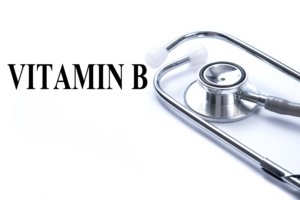B vitamins help patients that are about to develop psychotic disorders
 An increased intake of B vitamins can help improve concentration and other cognitive skills in young patients that are about to develop schizophrenia and other psychoses, according to a study conducted by scientists from Orygen, the National Centre of Excellence in Youth Mental Health, Australia. Here, it is important to consider all the different factors that may lead to a deficiency of the essential B vitamins, including unhealthy diets, too much sugar, energy beverages, alcohol, and other stimulants. It appears that the unhealthy lifestyle that many youngsters have increases their risk of psychoses. It is therefore not enough to treat them with anti-psychotic drugs and psychological therapy, if the brain and the nervous system lack essential nutrients.
An increased intake of B vitamins can help improve concentration and other cognitive skills in young patients that are about to develop schizophrenia and other psychoses, according to a study conducted by scientists from Orygen, the National Centre of Excellence in Youth Mental Health, Australia. Here, it is important to consider all the different factors that may lead to a deficiency of the essential B vitamins, including unhealthy diets, too much sugar, energy beverages, alcohol, and other stimulants. It appears that the unhealthy lifestyle that many youngsters have increases their risk of psychoses. It is therefore not enough to treat them with anti-psychotic drugs and psychological therapy, if the brain and the nervous system lack essential nutrients.
Both the brain and the nervous system need a daily supply of different B vitamins that work as a complicated biological team to support most of the body’s enzyme functions. The new study was headed by Dr. Colin O’ Donnel and Dr. Kelly Allott. The aim of the study was to look closer at the effect of supplementation with vitamin B6, vitamin B12, and folic acid (vitamin B9) given to patients with schizophrenia.
B vitamins lower levels of homocysteine
The two researchers studied whether supplements with the three B vitamins could lower levels of homocysteine, which is an amino acid with a complex metabolism. Elevated homocysteine levels are normally associated with an increased risk of cardiovascular disease. According the scientist, however, elevated homocysteine may also exacerbate the symptoms of schizophrenia and other psychotic disorders. Earlier studies have shown that supplementation with vitamin B6, vitamin B12, and folic acid can lower levels of homocysteine and relieve the symptoms of schizophrenia.
The two scientists behind the new study therefore wanted to see if these B vitamins would have the same effect on patients, who experienced their first psychosis.
|
The first psychosis may determine the course of the disease
It turns out that the first psychosis may be a precursor of the development of different psychotic disorders such as schizophrenia, bipolar disorders, and psychotic depression. The new Australian study included 100 young people, who had already experienced their first psychosis. Half of the participants was given supplements of the three mentioned B vitamins every day for a period of 12 weeks, while the other half received matching placebo. During that period, the researchers measured levels of homocysteine in the participants’ blood. They also rated symptoms and cognitive functions such as memory, attention, language, and learning capabilities in all the subjects.
B vitamins and their positive effect on homocysteine and mental health
The new study revealed that the participants that took B vitamin supplements for 12 weeks had an easier time solving problems that required concentration compared to the participants that took placebo. According to Dr. Allott, this serves to show that B vitamins have a protective effect on the nervous system and prevent the cognitive functions from deteriorating. Dr. Allott also found it highly interesting that the participants, who had abnormally high homocysteine levels at baseline experienced that the B vitamin supplements had the greatest effect on their ability to concentrate.
The results of the study suggest that people, who have already had their first psychosis, and who have abnormally high levels of homocysteine at the same time, are bound to benefit the most from taking supplements of vitamin B6, vitamin B12, and folic acid.
The study is published in the science journal Biological Psychiatry.
Lack of vitamin B3 is also related to other psychoses and schizophrenia
Vitamin 3 is also important for the energy turnover, the nervous system, and many other functions. Vitamin B3 is converted to the coenzyme NAD (nicotinamide adenine dinucleotide), which is involved in 400 biochemical reactions. In other words, a vitamin B3 deficiency can have widespread consequences.
Over 60 years ago, Dr. Abram Hoffer discovered that high doses of vitamin B3 can relieve schizophrenia. In the meantime, several studies have confirmed his observation. Lack of vitamin B3 can be a result of unhealthy diet habits, but according to leading scientists, the main cause is seen in connection with DNA variations that make it difficult for cells to bind NAD. Because of this, certain people need more vitamin B3 than others, so that NAD is able to support the many different biochemical reactions in their bodies.
Vitamin B sourcesCoarse and green food such as whole grain, oats, legumes, vegetables, fruit, brown rice, garlic, nuts, seeds, kernels, seaweed, and brewer’s yeast in particular. B vitamins are also found in liver, meat, fish, eggs, and dairy products. |
Important: Vitamin B12 is only found in animal sources
|
References
Orygen, the National Centre of Excellence in Youth Mental Health. B-group vitamins can improve concentration among people with first episode psychosis. ScienceDaily 2019
Penberthy. WT. Niacin rescues cannibalistic hamsters. The historical significance of 1940s mandatory niacin enrichment. OMS 2017
Hoffer A. Psychiatry yesterday (1950) and today (2007). From despair to hope with orthomolecular therapy. Victoria, BC, Canada: Trafford Publishing 2009
https://www.regionsjaelland.dk/sundhed/geo/psykiatrien/raadgivning/top/hvad-er-psykose/Sider/De-forskellige-former-for-psykose.aspx
Search for more information...
- Created on .
